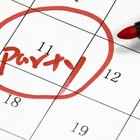
Leading a Bible study is an opportunity to impart spiritual truths and help people grow in their faith in God. But it can take hours of study and research to develop a lesson plan that is informative, inspiring and relevant to daily living. Just like preparing a sermon, writing a Bible study lesson must follow an outline to make sure there is focus and order. It will help you stick to the major points of the study and manage time so that the experience becomes enjoyable and worthwhile for those who will attend your Bible study.
Decide on a theme for the Bible study. Should it be based on a Bible character, theme or specific passage of the Bible? For example, the topic could be about "forgiveness" in which several passages related to the topic would be explored. Another topic could focus on the story of an important Bible personality like Moses, Job or Peter. Whatever the topic may be, your goal is to discover the lessons behind the stories and themes and help the attendees apply them in their daily lives.
For a fuller understanding of the topic, compare all the passages to be used to several translations of the Bible. There are many different versions of the Bible and it can be beneficial to decide on a version that is easier for your group to understand and explore. Once you determine which translation to use, make sure each attendee has a Bible in that version.
Study the passages carefully and think about any question or potential conflicting opinions that may arise. Prepare to create an atmosphere where questions are welcome, but keep peace and order at all times. Questions and discussion often make for a lively and interesting Bible study. Write down the questions that come to your mind.
Pray and study well so you can help provide some answers to the questions or at least point the group to someone, such as the pastor, who have a fuller understanding of biblical truths. Search the Bible for specific chapters and verses that can shed light on any doubts, questions or arguments that may arise. Write down these passages or mark them in your Bible for easy reference. Use a highlighter to mark specific passages that have relevance and provide clarity to a thought or idea.
Write a leader's guide or outline that you will refer to during the Bible study to help you keep your focus. Break the topic into three or four major points, and under each major point, include support points. It will help your attendees process the lesson better if each major point can be explained clearly.
Develop a study guide for attendees. Include question-and-answer handouts as well as sheets for taking notes. Give examples of how the topic can be applied to the attendees' daily lives. Provide all the passages that will be studied as well as extra reading suggestions to complete at home. This will allow the group members to do their own reflecting and reading at home as well as provides a summary of the completed study and any points they may what to remember.
Review all the information collected and ensure that no points, thoughts or passages have been left out. Ensure that there is enough time allotted for discussion as well as detours from the main topic.
Related Articles

Is Effective Communication a Two-Way ...

Ideas for Adult Bible Games

How to Communicate with Influence

Ideas for Wednesday Night Bible Study

How to Conduct an Intercessory Prayer ...

Bible Study Activities for Young Adults

How to Repair Your Relationship When ...

How to Write a Proposal for an ...

How to Apply Communication Theories to ...

Free Bible Study Activities for 12- to ...

How to Write an Essay About a Good ...

How to Explain Something Clearly

How to Make Bible Trivia Games

Youth Bible Trivia Games

How to Run a Church Youth Program

How to Lead a Church Home or Cell Group

LDS Games for Sunday School

Interpersonal & Intrapersonal Conflict

How to Form an Event-Planning Committee

Free Children's Bible Activities Grades ...
References
Writer Bio
Elizabeth Vander Heide has been writing since 2003. She owns and operates a successful mural and hand-painted furniture business. In addition to art and decorative painting, she is an experienced hairstylist and makeup artist with a wealth of knowledge of the beauty industry. Vander Heide writes decorative painting instructions and seminar guides for professional tole painters. She studied at Cappa School of Hairstyling.
Photo Credits
bible study and notes image by Allen Penton from Fotolia.com